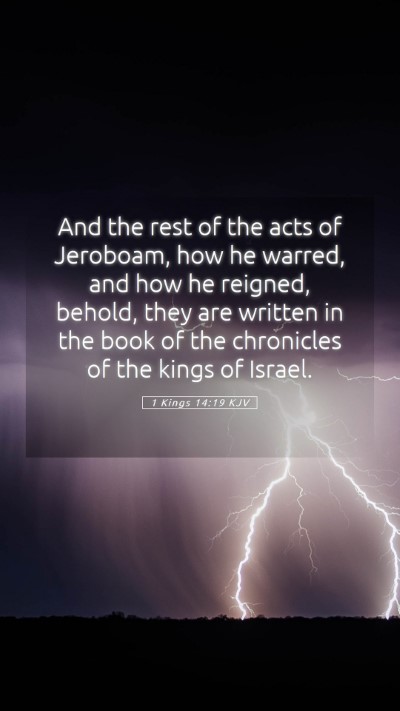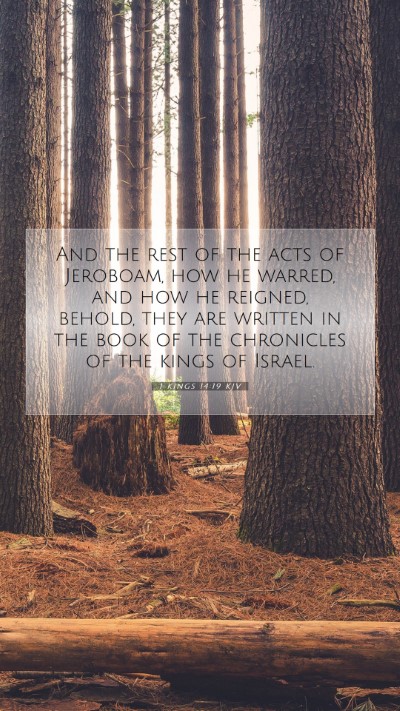Understanding 1 Kings 14:19
The verse, 1 Kings 14:19, serves as a critical part of the narrative concerning the kings of Israel and the repercussions of their sinful tendencies. This commentary provides a thorough understanding of this verse, integrating insights from renowned public domain commentaries, including those by Matthew Henry, Albert Barnes, and Adam Clarke.
Bible Verse Explanation
1 Kings 14:19 states: “And the rest of the acts of Jeroboam, how he warred, and how he reigned, behold, they are written in the book of the chronicles of the kings of Israel.” This verse underlines a few critical themes and elements that demand our attention.
- Historical Context: Jeroboam was the first king of the northern kingdom of Israel after the split from Judah. His reign was marked by both political intrigue and spiritual failure, leading to significant consequences for the nation.
- Chronicles Reference: The mention of “the book of the chronicles” suggests there are more extensive records detailing Jeroboam’s reign, which serve as a valuable source for understanding Israel's history.
- Thematic Significance: This verse emphasizes the contrast between Jeroboam's military and political endeavors and his failure to adhere to God's commandments. His reign did not just include victories but also encompassed failures in spiritual leadership.
Bible Verse Meanings and Interpretations
Both Matthew Henry and Albert Barnes draw attention to the importance of learning from Jeroboam's failures. His military successes are overshadowed by his spiritual downfalls, thereby serving as a cautionary tale:
- Failure to Worship Properly: Jeroboam introduced idol worship to maintain his political power, demonstrating that political ambitions can lead to spiritual compromise.
- Legacy of Sin: His actions set a precedent for future kings, ultimately leading Israel further away from God. Thus, his legacy is characterized more by his sins than by his accomplishments.
- Call to Reflection: The verse invites readers to consider their own lives. Just as Jeroboam’s failure had lasting ramifications, our choices also impact future generations.
Deepening Understanding through Scripture Analysis
Adam Clarke emphasizes that the narrative not only recounts historical facts but also serves a theological purpose: to illustrate God’s sovereignty in the face of human disobedience. This duality of historical recounting and divine commentary is a hallmark of the biblical text.
Applications in Daily Life
The principles derived from 1 Kings 14:19 can serve as a foundation for personal reflection and growth:
- Leadership Responsibilities: Leaders are reminded that their spiritual guidance has implications beyond their tenure.
- Spiritual Vigilance: Believers are encouraged to remain vigilant against the influences that encourage compromise of their faith.
- Study of History: The verse teaches the importance of studying scripture within its historical context to glean pertinent life lessons.
Related Bible Cross References
The insights gained from 1 Kings 14:19 can be enriched by referencing related scripture passages that underscore similar themes:
- 1 Kings 12:26-30: Discusses Jeroboam's establishment of idol worship.
- 2 Chronicles 13:6-8: Speaks to the divided kingdom and its consequences.
- 1 Kings 15:29-30: Shows the continuity of sin in Israel's kingship influenced by Jeroboam.
Conclusion
In conclusion, 1 Kings 14:19 is not merely a historical recount but a profound lesson in the interplay between power, leadership, and spirituality. Understanding this verse and its implications invites readers into a deeper engagement with Scripture. By studying the context and applying its teachings, believers can gain insight into their own spiritual lives and leadership responsibilities.
Through thorough Bible study insights, this verse encourages individuals to explore the meaning of Bible verses, appreciate the historical context of Bible verses, and recognize their significance in interpreting personal faith journeys.


